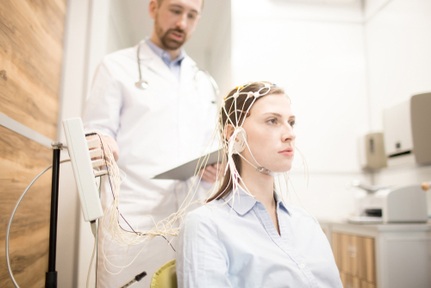Thinking caps that electrically stimulate the brain could boost memory of people with dementia
Academics have discovered electricity-controlled ‘thinking caps’ can boost people's memory by stimulating parts of the brain.

The working memory and long-term memory of people aged 65 to 88 has been found to have performed better after wearing a cap filled with electrodes that altered activity (brainwaves) in specific parts of their brains.
Describing the stimulation technique as ‘transcranial alternating current stimulation’ (tACS), study volunteers wore a device on their skull that produced a controlled electrical current for 20 minutes daily for four consecutive days.
Scientists discovered that after wearing the device, the volunteers performed better at word memorisation games, which tested their immediate working memory and their long-term memory.
Scientists believe the brain adapted and rewired itself - known as neuroplasticity - after it was stimulated for four days in a row.
Dr Robert Reinhart, a neuroscientist from Boston University and co-author of the study, published in the journal Nature Neuroscience, stated: ‘Our findings demonstrate that the plasticity of the aging brain can be selectively and sustainably exploited.’
Volunteers had to memorise lists of words, which they were asked to recall a month later. The results showed volunteers who were struggling with the memory games at the beginning of the experiment were those whose memory improved the most.
Dr Reinhart added: ‘The improvements were rapidly induced by the second day…and lasted for at least one month after intervention.’
All 150 participants in the study were healthy, with no cognitive impairment.
Working memory is how you retain day to day information in your mind and boosting it required low-frequency stimulation of the prefrontal cortex. Long-term memory used to recall something that may have happened a long time ago, required high-frequency stimulation of the parietal cortex.
Dementia is caused by dying brain cells leading to memory issues. The researchers are now looking into whether the technology can be used for Alzheimer's disease to stimulate the surviving brain cells. Academics are also considering its use for people with obsessive compulsive disorders (OCD) or schizophrenia.
In response to the study, Dr Susan Kohlhaas, the director of research at Alzheimer's Research UK, said: "We don't know if brain stimulation techniques have potential to help people with dementia but there is research under way in this area."
Latest News
 29-Jul-24
Dementia Bus gives carehome.co.uk staff insight into life with dementia
29-Jul-24
Dementia Bus gives carehome.co.uk staff insight into life with dementia
 27-Jul-23
UK's top home care agencies in 2023 revealed
27-Jul-23
UK's top home care agencies in 2023 revealed
 30-Nov-22
A quarter of older people keep their falls secret from family
30-Nov-22
A quarter of older people keep their falls secret from family
 29-Nov-22
'Covid-19 has not gone away' say terminally ill
29-Nov-22
'Covid-19 has not gone away' say terminally ill
 28-Nov-22
IT consultant who received poor care opens 'compassionate' home care business
28-Nov-22
IT consultant who received poor care opens 'compassionate' home care business